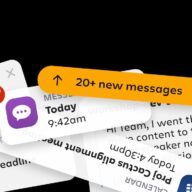ah—performance review season. around the world, at this very minute, employees are working on their self-reviews and performance goals, all while preparing for that anxiety-inducing meeting with the boss.
“where do you see yourself heading this year?” “please come prepared with goals to discuss.” it can be overwhelming to look over an entire year’s work and try to figure out how to make it better, but there’s a pretty good chance you’ll be asked to do just that.
don’t fret! it doesn’t have to be this way. in fact, goal setting can be one of the most powerful activities you do this year. to help you get over the jitters and come up with some goals that actually help move you forward, check out the list below.
why performance goals need to be crystal clear
you might think it’s obvious what your goals are: you want to get that raise, get that promotion, not get fired—a broad, vague thing that moves your career forward in some way. these goals are… well, they’re not great. they’re too broad and nebulous to start taking clear actions on.
goals should be clear, specific, measurable, and actionable. they should be broken down small enough to where you can jump right in, but still be big enough to move the needle forward on your career as a whole (as well as the team’s performance).
the smart system for goal setting is a fantastic way to get started. break each goal down using the acronym smart:
- specific: the goal makes it clear what will be accomplished, who will accomplish it, and how.
- measurable: the goal is something that can be measured and tracked.
- achievable: your goal should be something you can actually realistically accomplish. stretch goals are great, but don’t stretch so far you guarantee failure.
- relevant: there should be a solid reason behind your goal. it should relate somehow to the job you or your team perform.
- time-bound: when will the goal be completed? next quarter? next year?
the okr framework (objectives and key results) is another popular method for setting and tracking goals. originating at google way back in 1999, okrs have been used to power some of the biggest companies in the world to new heights. it stands to reason they can work for you, too. best of all, the framework can be tracked right in trello.
whichever framework you choose, having clear and specific goals makes it significantly more likely that you’ll actually reach them. it’s been known for decades that goal clarity has a direct impact on motivation. additionally, people that write down their goals are 20% more likely to accomplish them.
on the flip side, you might have absolutely no clue where to start with setting goals. perhaps you’re new to the role, or your old boss never asked for something like this. maybe you’re used to something like sales, where the goals are clear—exceed your quota by 15%, for example. now you’re being asked to provide goals in a new and less number-driven environment, and you’re feeling a little lost.
4 employee performance goals you can start working towards today
yes, it is possible to set a clear, measurable goal, even if you’re on a knowledge team with projects that are anything but clear and measurable. let’s look at four examples of performance goals you can try next quarter.

1. learn something new (and make it official)
this is an excellent way to improve your own knowledge and ability, and it can easily be shared with the team and translated into improved performance for everyone. the completion of new certifications is a fantastic goal to set.
ideally your company will pay for this as part of continuing education or an employee learning and development program, but if not it may still be worthwhile—especially if it’s something that can be carried beyond your current employer. you’ll also need to make sure you have time set aside to stay on track with any classes or exams needed for the certification.
to show your manager that you’re a certified go-getter, have an idea of the specific certification you want to go for in mind before the meeting. cost and time frame are also good to know in advance. finally, have an idea of how the certification will benefit you or the team. they’ll probably want to know, especially if they’re paying for it.
2. speak up more in meetings
meetings are tough. it can be hard to put yourself in the spotlight, even for the most confident among us. if you deal with any sort of social anxiety or imposter syndrome, it’s even worse. with the rise of zoom, it’s easier than ever to fade into the background.
however, that’s almost certainly not the best thing for your career or your team’s performance. and, honestly, if you have to be in the meeting to begin with, you might as well make the most of it, right?
speaking up more is a fantastic goal to set, and it’s easy to track and measure progress. you can start by aiming to contribute something to each meeting you’re in that week, even if it’s just asking for simple clarification or saying hello. as you gain comfort, you can kick it up a notch by offering opinions and answering questions.
3. manage your time more effectively
being more focused and productive is always a great goal to move towards, and it’s something nearly all of us need to work on (though admittedly, some more than others). everyone can benefit from a little 世界杯欧洲预选赛直播平台 power-up.
this one can be a little tougher to fit into the smart framework. you’ll need to think carefully about what increased efficiency would look like in your role, how you’ll track it, and how it will benefit the team.
let’s use email as an example—it can be a huge time sink, with the average professional spending nearly 30% of their day in their inbox. let’s say you track your time and currently spend two hours per day on email.
you might aim to limit that to one hour per day, or reduce how many times you check it. once in the morning, again midway through the day, and one last time at the end of the day is a workable schedule. the benefit is that this provides you with more time to focus on your actual work.
4. work on your emotional intelligence
emotional intelligence is defined as the ability to understand and work with emotions, both within yourself and with others. if you’ve ever walked away from a situation because you felt yourself losing your temper, you displayed emotional intelligence. it’s almost always better to deal with a tricky scenario when heads are cool and people are collected.
emotional intelligence is a hot commodity in the workplace right now—the ups and downs of the last couple years have made people generally more sensitive to the health of their work environment, and poor emotional intelligence can be one of the biggest causes of a toxic workplace. the research clearly shows that it heavily impacts our perception.
an excellent goal would be to practice some of the skills that contribute to emotional intelligence:
- watch for opportunities to offer support to team members.
- offer to help mediate a conflict.
- share your experience with a struggling team member.
- provide positive feedback and encouragement to coworkers.
emotional intelligence is a little tough to quantify and measure, but when it’s being practiced actively, the results are certainly noticeable. people will feel more comfortable, confident, and able to do their best work.
crush your goals and build a better you next year
setting goals is tough. setting detailed, specific, actionable goals can be downright brutal. and presenting them to your boss? forget about it.
however, few things have as much potential to transform your mindset, daily work, and yearly progress as a great performance goal. take some time to think through your own goals (with a little help from the examples above) and get into the nitty gritty.
your boss will be impressed—but more importantly, you’ll be ready to grab the future by the horns and show it who’s really boss (hint: it’s totally you). go get ‘em!








































